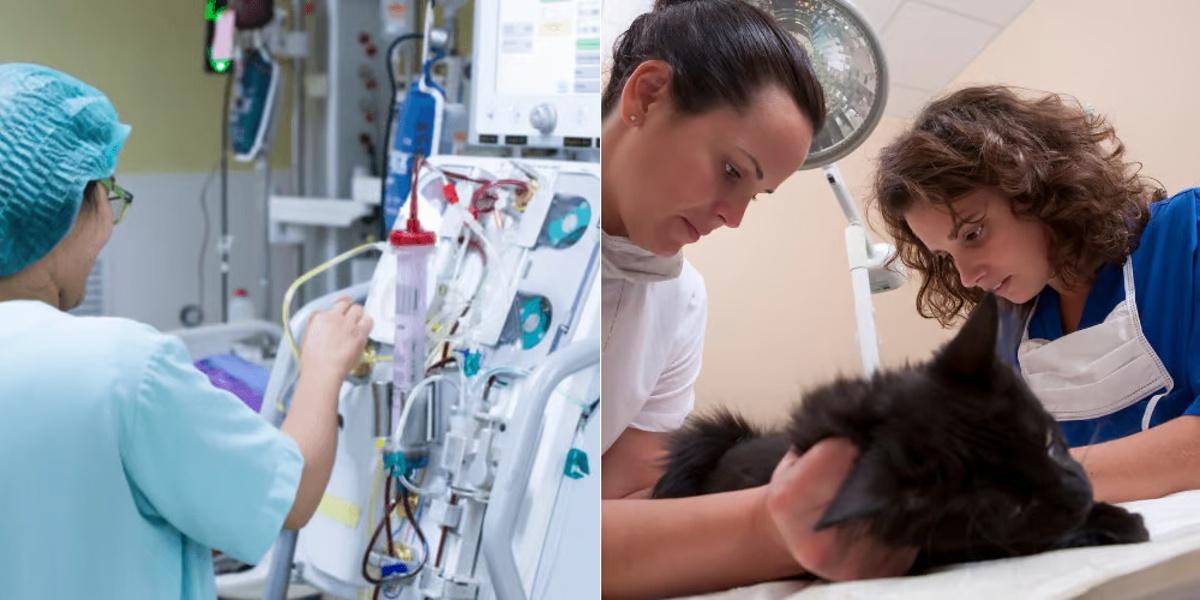Hemodialysis Technician vs Veterinary Assistant

Want personalized recommendations?
Let's match you to the right program

Key Points:
- Hemodialysis Technicians assist patients with kidney dialysis; Veterinary Assistants support veterinarians in caring for animals.
- Hemodialysis Technicians typically earn higher salaries than Veterinary Assistants.
- Demand for Hemodialysis Technicians is growing due to the increasing number of people with kidney disease, while Veterinary Assistants are needed in veterinary clinics and hospitals.
- Both jobs require in-person training, but Hemodialysis Technicians may have more extensive certification requirements.
- Hemodialysis Technician training can be more expensive and take longer than Veterinary Assistant training.
In today's blog post, we will be comparing two rewarding career paths in the healthcare industry - Hemodialysis Technician and Veterinary Assistant. Both professions require a passion for helping others and a desire to make a difference in the lives of patients and animals. However, there are distinct differences between the two roles in terms of job responsibilities, education and training requirements, career outlook, and salary. Let's take a closer look at each profession to help you decide which path may be the best fit for you.
Article continues after recommendations
Recommended for you
What is a Hemodialysis Technician and Veterinary Assistant?
Hemodialysis Technician: A Hemodialysis Technician, also known as a Dialysis Technician, is a healthcare professional who operates and maintains dialysis machines used to treat patients with kidney disease. These technicians are responsible for monitoring patients during dialysis treatment, ensuring their safety, and making necessary adjustments to the dialysis machine as needed. They also work closely with other healthcare professionals, such as nurses and doctors, to provide comprehensive care to patients.
Veterinary Assistant: A Veterinary Assistant is a healthcare professional who provides support and assistance to veterinarians in caring for animals. They perform a variety of tasks, including cleaning and disinfecting cages, restraining animals during examinations or procedures, administering medications, and assisting with surgeries. Veterinary Assistants also interact with pet owners, provide basic animal care instructions, and maintain medical records.
Difference between a Hemodialysis Technician and Veterinary Assistant
While both Hemodialysis Technicians and Veterinary Assistants work in healthcare settings and play crucial roles in patient care, there are several key differences between the two professions:
-
Job Setting: Hemodialysis Technicians primarily work in dialysis centers or hospitals, where they provide care to patients with kidney disease. On the other hand, Veterinary Assistants work in veterinary clinics, animal hospitals, or research laboratories, where they provide care to animals.
-
Patient or Animal Care: Hemodialysis Technicians focus on providing care to patients with kidney disease, ensuring they receive proper dialysis treatment and monitoring their vital signs. Veterinary Assistants, on the other hand, focus on providing care to animals, assisting veterinarians with examinations, treatments, and surgeries.
-
Scope of Practice: Hemodialysis Technicians have a more specialized scope of practice, as they are trained to operate and maintain dialysis machines and closely monitor patients' conditions during treatment. Veterinary Assistants have a broader scope of practice, assisting with various veterinary procedures and providing general animal care.
-
Emotional Connection: Hemodialysis Technicians often develop long-term relationships with their patients, as they provide ongoing care for individuals with chronic kidney disease. Veterinary Assistants also develop relationships with animals and their owners, but the nature of their work may involve caring for a variety of animals rather than building long-term relationships with individual patients.
Hemodialysis Technician vs Veterinary Assistant: Job Description
Hemodialysis Technician:
- Operate and maintain dialysis machines
- Monitor patients during dialysis treatment
- Adjust dialysis machine settings as needed
- Document patient information and treatment progress
- Collaborate with healthcare team to provide comprehensive care to patients
- Educate patients and their families on dialysis procedures and self-care
Veterinary Assistant:
- Clean and disinfect cages and equipment
- Restrain animals during examinations or procedures
- Administer medications or treatments under the supervision of a veterinarian
- Assist with surgeries and other veterinary procedures
- Provide basic animal care, including feeding, grooming, and exercising
- Maintain accurate medical records
Hemodialysis Technician vs Veterinary Assistant: Education and Training
Hemodialysis Technician:
- Most Hemodialysis Technician programs require a high school diploma or equivalent for admission.
- Some states may require certification or licensure, which typically involves completing an accredited training program and passing a certification exam.
- Hemodialysis Technician programs can range from a few months to one year in length and include both classroom instruction and clinical rotations.
- Coursework typically covers topics such as anatomy and physiology, dialysis principles, infection control, patient assessment, and medical ethics.
Veterinary Assistant:
- Educational requirements for Veterinary Assistants vary by state and employer.
- Some Veterinary Assistants receive on-the-job training, while others complete a formal training program or earn a certificate or associate degree in veterinary assisting.
- Formal training programs can range from a few months to one year and cover topics such as animal anatomy and physiology, veterinary medical terminology, animal care and handling, and veterinary office procedures.
- Some states may require Veterinary Assistants to pass a certification exam or meet other licensing requirements.
Get courses selected just for you
Try our powerful search engine
Article continues after recommendations
More recommendations for you
Hemodialysis Technician vs Veterinary Assistant: Career Outlook and Salary
Hemodialysis Technician:
- The demand for Hemodialysis Technicians is expected to grow due to the aging population and the increasing number of individuals with kidney disease.
- According to the Bureau of Labor Statistics, the median annual wage for Hemodialysis Technicians was $40,350 in May 2020.
- Job opportunities for Hemodialysis Technicians can be found in hospitals, dialysis centers, and other healthcare settings.
Veterinary Assistant:
- The demand for Veterinary Assistants is also expected to grow, driven by the increasing number of pet owners seeking veterinary care for their animals.
- According to the Bureau of Labor Statistics, the median annual wage for Veterinary Assistants was $28,590 in May 2020.
- Job opportunities for Veterinary Assistants can be found in veterinary clinics, animal hospitals, research laboratories, and animal shelters.
Final Thoughts
Choosing a career path can be a daunting decision, but understanding the differences between professions can help you make an informed choice. Hemodialysis Technicians and Veterinary Assistants both offer rewarding opportunities to make a difference in the lives of others, whether it's through providing essential care to patients with kidney disease or assisting in the care of animals. Consider your interests, strengths, and career goals when deciding which path is the best fit for you.
Dreambound has strategically placed its educational programs in various locations, making it easy for aspiring individuals to access valuable opportunities. For a thorough insight into the dynamic realms of these two vocations, we encourage you to delve into more detailed information by visiting:

Harold Roldan is a Growth team member at Dreambound. With a background in IT, he works with data and automation to improve team efficiency and workflows. He spends his free time playing musical instruments or studying data, computers, and technology.



